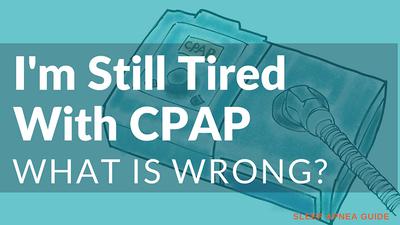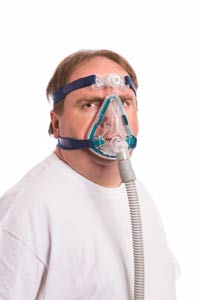Still tired with CPAP treatment. What is wrong?
by Ron Gronowski
(Traverse City, Michigan)

5 Reasons Why The Benefits From CPAP Therapy Are Missing
I use my CPAP machine every evening, but I still am tired during the day.
What is wrong?
Answer
If you're still tired after using the CPAP machine, then you most certainly have CPAP resistant syndrome or True Residual Sleepiness.
The science explains that there is a residual sleepiness in some patients with sleep apnea, which takes time to disappear (1).
You can help the residual sleepiness to diminish, by following the tips from this article.
At the end of the article, you'll also get a proven treatment for the most severe cases.
Now, the first step in your "treatment" is to understand the causes behind your tiredness:
3 Reasons Why You're Still Tired With CPAP:
The CPAP resistant syndrome exists in CPAP users who have:
- hidden problems that directly affects CPAP therapy,
- problems that are not connected with CPAP therapy, but affects the quality of sleep
- no underlying issues - science call this situation true residual sleepiness.
Causes That Directly Lowers CPAP Sleep Quality
1. CPAP Mask Leaks
 Inexperienced CPAP users almost always have this problem. That's why they are the majority who complain about fatigue, headache and sleepiness during the day.
Inexperienced CPAP users almost always have this problem. That's why they are the majority who complain about fatigue, headache and sleepiness during the day.If your mask leaks just a little bit, you're accumulating sleep debt. So fixing these leaks usually leads to a better quality of life.
Do not underestimate the air leaks!
Learn how to eliminate the CPAP mask leaks here.
2. Incorrect CPAP Air Pressure
Believe it or not, the CPAP titration study (where the CPAP is calibrated to the correct pressure that opens your airway) doesn't always show the correct settings to get good sleep (2).
I find the incorrect pressure setting in a lab a big problem. This means you may go home from the sleep study with a wrong setup.
It also means it's possible you don't get enough pressure to open your airways.
The result: tiredness, headaches, depression during the day.
Do you have a data capable CPAP machine? If so, you can track your therapy data to spot issues.
How to read your sleep quality report (for ResMed S9 Elite Users)
However, you need to know some medical terms to understand what the sleep data shows you (AHI, RDI, CSR, etc). It's better to check the data with your doctor.
What is AHI?
3. Mask Discomfort
Unfortunately, it's not uncommon to take some time to adjust to sleeping with a CPAP mask on your face.
It's not easy. However, if you struggle a lot to adapt to your CPAP mask, you'll get poor sleep.
Here are some examples of problems caused by sleeping with a CPAP mask:
- forehead hurts,
- feeling of claustrophobia and suffocation,
- sneezing after you put the mask on,
- dry mouth from sleeping with your mouth open,
- waking up with nasal congestion,
- sleeping in strange positions to keep the mask from leaking,
- the airflow from CPAP feels to dry and unbearable,
- and many, many more...
Learn How to Make a CPAP Mask More Comfortable
Causes Not Linked With CPAP, But Hurts Your Sleep
1. Central Sleep Apnea
Central Apnea is a sleep disorder where the brain forgets to command your body to breathe.
Your CPAP is useful only if you have obstructive apnea, but is useless for the central apnea.
Learn How to Treat Central Sleep Apnea
Some people have a combination of obstructive and central events, which is a situation difficult to diagnose in sleep studies.
Again, you need your sleep data to see if you have unusual patterns in your sleep. Contact your doctor to discuss this problem.
How to Diagnose Mixed Sleep Apnea?
Your spouse can be helpful, by checking if you still stop breathing in sleep even if you use the CPAP.
2. Medications That Can Affect Your Sleep
The most common drugs that can make you feel sleepy during the day, are:
- Antidepressants
- Sedative medication
- Medication that cause insomnia
If you take medication, review them with your doctor, to check if they may interact with CPAP therapy.
For a full list of medications that can make you feel tired in the morning (even if you use your CPAP), read the Harvard report.
The Mystery of True Residual Sleepines
Only 10% of patients remain sleepy on CPAP, even after you exclude the other causes of sleepiness (3).
Imagine that after you struggled to find the perfect CPAP mask, adjust the CPAP pressure, improve your sleep hygiene, and your sleep data looks perfect, you are still tired during the day.
It can be very frustrating.
Being tired with CPAP is a mystery even for scientists. However, they may have some clues that can help explain this phenomenon:
Neuron damage from untreated sleep apnea
Scientists found that long-term exposure to low levels of oxygen in mice results in sleepiness during the day that persists at least several weeks after the oxygen levels are restored (4).
This observation prompted the scientists to ask whether the neurons from the sleep control regions of the brain are damaged from long-term hypoxia (low oxygen levels).
In other words, the longer you had untreated sleep apnea, to more damaged your neurons have.
My question to you is... Do neurons regenerate?
Depression and Obesity
A study from Grece showed that sleep apnea patients with depression are still tired even with nightly CPAP usage of 6 hours (5).
The scientists also observed that obese individuals also had residual sleepiness with CPAP.
Bottom line... If you are overweight,
it's important to lose weight - your sleep will improve.
Can The Residual Sleepiness Be Treated?
The good news is that the residual sleepiness will disappear in time.
An extensive study published in France (with 1047 patients) showed that 12% of patients using CPAP for more than 3 hours per night were still sleepy at the one-year follow-up visit( 6).
However, the sleepiness decreased significantly with longer CPAP use :
- only 8.7% patients still had residual sleepiness using the CPAP 6 hours per night.
- 18.5% patients still had sleepiness after using the CPAP 4 hours or less per night.
How Can You Treat True Residual Sleepiness?
If you don't want to wait for the tiredness to disappear in weeks or months of CPAP therapy, there is another solution: stimulant drugs that alleviate sleepiness (7).
It may be necessary for the doctor to prescribe Modafinil (Provigil) or Armodafinil (Nuvigil) as a stimulant (8).
These drugs have been proven effective over the years, where the patients experience increase wakefulness and daytime function.
However, the doctor has to be very careful with this prescription. If you don't wear the CPAP every night for 6 hours, with good sleep data, these stimulants can harm you.
You need to sleep enough with your CPAP, to get these drugs.
Hopefully, these tips can guide you towards answering your question.
Remy Thierry
Founder of Sleep Apnea Guide
References:
1. Gasa M, Tamisier R, Launois SH, et al. Residual sleepiness in sleep apnoea patients treated by continuous positive airway pressure. J Sleep Res 2013; 22:389–397
2. Huang HC, Hillman DR, McArdle N. Control of OSA during automatic positive airway pressure titration in a clinical case series: predictors and accuracy of device download data. Sleep 2012; 35:1277–1283.
3. Vernet C, Redolfi S, Attali V, et al. Residual sleepiness in OSA: phenotype and related symptoms. Eur Respir J 2011; 38:98–105.
4. Veasey SC, Davis CW, Fenik P, et al. Long-term intermittent hypoxia in mice: protracted hypersomnolence with oxidative injury to sleep-wake brain regions. Sleep 2004; 27:194–201.
5. Koutsourelakis I, Perraki E, Economou NT, et al. Predictors of residual sleepiness inadequately treated OSA patients. Eur Respir J 2009; 34:687–693
6. Pepin JL, Viot-Blanc V, Escourrou P, et al. Prevalence of residual excessive sleepiness in CPAP-treated OSA patients: the French multicentre study. Eur Respir J 2009; 33:1062–1067.
7. Dinges DF, Weaver TE. Effects of modafinil on sustained attention performance and quality of life in OSA patients with residual sleepiness while being treated with nCPAP. Sleep Med 2003; 4:393–402.
8. Roth T, White D, Schmidt-Nowara W, et al. Effects of armodafinil in the treatment of residual excessive sleepiness associated with OSA: a 12-week, multicenter, double-blind, randomized, placebo-controlled study in nCPAP-adherent adults. Clin Ther 2006; 28:689–706.
Comments for Still tired with CPAP treatment. What is wrong?
|
||
|
||
|
||
|
||
|
||
|
||
|
||
|
||
|
||
|
||
|
||
|
||
|
||
|
||
|
||
|
||
|
||
|
||
|
||
|
||
|
||
|
||
|
||
|
||
|
||
|
||
|
||
|
||
|
||
|
||
|
||
|
||
|
||
|
||
|
||
|
||
|
||
|
||
|
||
|
||
|
||
|
||
|
||







